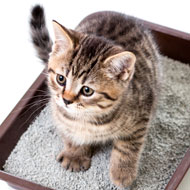New litter tray monitors cat health

The litter tray device gathers data on weight, visit habits, waste and behaviour.
A novel device for the litter box will allow owners to receive alerts about their cat's health through an app on their phone. The aim is to allow early detection of weight loss or illness such as urinary blockage.
New device Tailio is a world first, collecting data about the cat's weight, waste, litter tray visits and behaviour. For each individual cat using the tray, a unique profile of physiology and behaviour called a "pawprint" is generated.
If anything out of the ordinary is recorded, for example a change in the cat's weight or visit patterns, an alert is sent to the owner's smartphone app.
Dr Mark Goldstein DVM commented: "When a health issue arises, getting your cat proper medical care as soon as possible is critical to the outcome.
"A common urgent care crisis for cats is a urinary blockage, which can become life threatening in males in just 24-48 hours.
"Tailio will not only help owners to detect early signs of health issues such as feline lower urinary tract disease, but with the new feature to find local vet services, will also help owners quickly know where to take their cat for medical care."
Pet Wireless developed the device, which sits underneath the cat's litter tray, alongside veterinary surgeons to ensure the design would be non-intrusive to avoid causing stress to the cat.
The project has a new funding goal of $150,000. If this is achieved, creators hope to develop the technology further, including a feature that provides information on local veterinary services based on the owner's location.
Founder of Pet Wireless, Alex Treiner, commented: "Being able to bring a product to market that we know will be of great benefit to pet families is a wonderful feeling".



 The Veterinary Medicines Directorate (VMD) is inviting applications from veterinary students to attend a one-week extramural studies (EMS) placement in July 2026.
The Veterinary Medicines Directorate (VMD) is inviting applications from veterinary students to attend a one-week extramural studies (EMS) placement in July 2026.